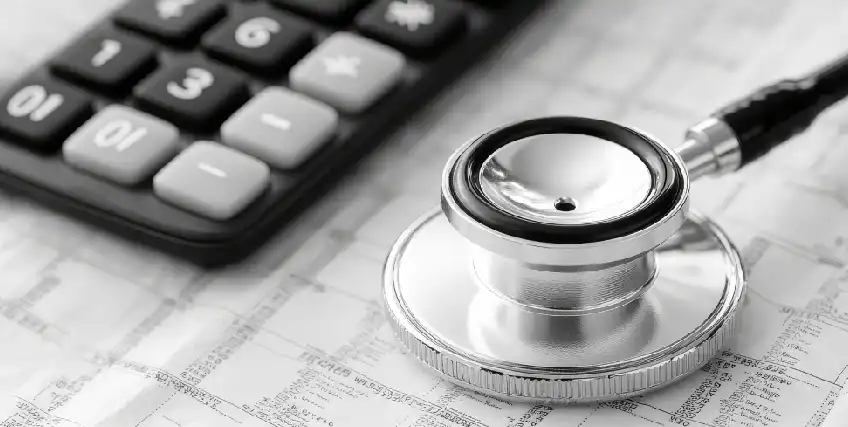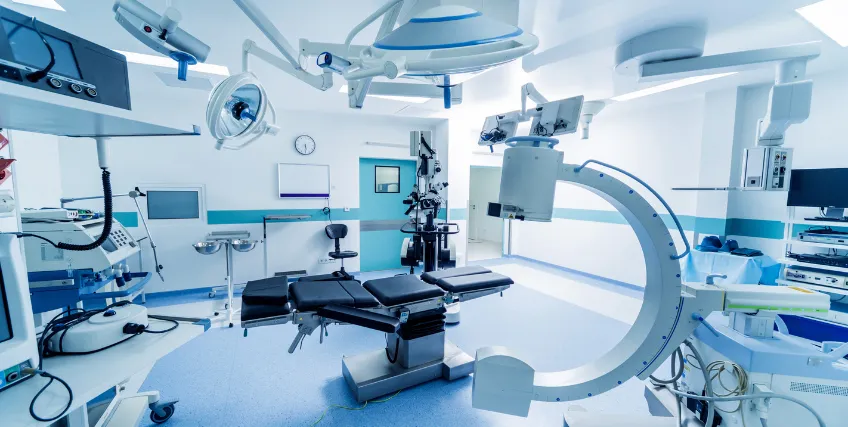The 5 Best Business Loans for Physicians With Bad Credit
April 10, 2025 | Last Updated on: April 10, 2025

Life as a medical professional can be both lucrative and fulfilling. But if you’re a physician operating a private practice, it can also be a very expensive one. The bills quickly add up between student loans, business startup costs, malpractice insurance, and more. It’s not unusual for high-earning doctors to have fallen behind on monthly payments.
If you’re a doctor with bad credit looking to make further investments in your practice, you’re not out of luck. There are business loans for physicians who have bad credit.
In this article:
- Medical financing options for physicians
- Advantages of medical practice lending for physicians
- How to get medical loans
Understanding Your Credit
Your credit score is an important factor in the loan application process. Both traditional lenders, like banks and credit unions, and online lenders use credit scores to determine a potential borrower’s creditworthiness. Effectively, it’s a number that shows how likely you are to meet the loan terms.
A credit score is a number created by the Fair Isaac Corporation (where the name FICO score comes from) that ranges between 300 and 850. According to Experian, it’s calculated using your payment history, your total debt, the length of your credit history, and your tendency to open new accounts.
People with higher scores pay lower interest rates on loans and credit cards. They’re more likely to be approved for larger loan amounts with more favorable repayment terms. And because they’re paying less, they can generally move forward with a high score.
Bad credit is usually considered a score lower than 580. Physicians with a lower credit score might struggle to get medical financing in the first place and, if they do, may pay much higher interest rates.
Advantages of Medical Financing
Even if you’re a physician with bad credit, there are advantages to being a healthcare business. Lenders don’t just look at your credit report; they look holistically at the business and owner. In a recession-proof business-like medicine, that can be a major benefit.
Despite medical costs and the out-of-pocket investment, you may have already made, physician practices tend to make very good money by billing health insurance companies and receiving patient co-payments. The median salary for an American physician is over $190,000 and the demand for physicians is ever-increasing, according to the Association of American Medical Colleges.
Medical practice lending recognizes that healthcare providers have significant costs, but they also tend to earn significant revenues. As such, many financial institutions will assess your practice to see the medical treatments and medical procedures offered and weigh the likelihood of business success against your credit score. The business potential may still make you an attractive borrower.
How to Improve Your Credit
All of that said, it’s still easier to get medical financing at the lowest rates if you have stronger credit. If you have the time to improve your credit score before applying for financial assistance, it’s a good idea to make an effort. There are a few simple actions you can take quickly.
Make On-Time Payments
The most important thing anyone, physician or otherwise, can do to improve their credit score is to make every single payment on time and in full. Electric bills, credit cards, student loan payments — everything. Any late or short payment can be reported to the credit bureaus, and your score can be brought down.
But you can use this to your advantage. Think about using one of your credit cards specifically for one regular expense. Gas, for example. Credit agencies will recognize that regularity if you’re only buying gas with that card and paying it off in full every month.
If you need debt consolidation, consider contacting a credit card company or lender to start a payment plan that can improve your credit. Do your best to get favorable terms that offer a competitive annual percentage rate (APR) and doesn’t have prepayment penalties.
Establish Some Credit History
Your score is better if you can show that you’ve been a good borrower for a long time. So, if you got a credit card in college, it’s probably wise to keep that account open and make payments on it. That could even be your monthly gas card, as mentioned above. That long payment history shows you’re dependable.
Sometimes, the best thing you can do to raise your credit score before applying for medical financing is simply pay down older personal loans and wait.
Reduce Credit Accounts
Credit agencies see a red flag when you open or apply for a lot of credit in a short span. It may look like you’re struggling financially and taking on debt to pay off other debt. Whenever you open a new line of credit or take out a loan, you’re doing it for the right reasons.
If you have bad credit, before you apply for medical financing, it’s a good idea to try to consolidate your debt by paying off any unsecured personal loans or credit card debt.
Best Medical Loans for Physicians
There are many loan products available for people with bad credit. If you want to open a private practice, you’ll likely need medical financing to get the capital you need. These are some of the best financing options to consider.
1. SBA Loans
Partially backed by the U.S. Small Business Administration (SBA), SBA loans are some of the most competitive in the lending industry.
Depending on the loan program, the SBA may guarantee as much as 85% of the loan, lowering the risk of default for both you and the lender. That guarantee frees lenders to give loans they may not have been willing to approve otherwise. It also typically means the lender can offer a lower interest rate. However, eligibility requirements tend to be strict.
Borrowers typically need a high credit score, as well as a certain amount of time in business, annual revenue requirements, and more. While it’s possible to get an SBA loan with less than stellar credit, especially a medical loan that’s likely for a high-profit-potential business, it’s far from a guarantee.
2. Term Loans
Term loans are the most common type of loans. A lender provides loan proceeds upfront to your bank account and you repay them, plus interest and origination fees, over a set period.
These loans may also be difficult to get with bad credit, but it’s certainly possible. More likely, you’ll be treated as a subprime borrower, meaning you’ll experience more difficult loan terms, higher interest rates, and stricter repayment terms. You may also have to provide a personal guarantee or put up collateral, like real estate or other business assets, to secure the loan.
Again, it’s more likely to secure loan funds for medical financing than, say, for a retail startup idea. Medicine is competitive, of course, but it’s a recession-proof business that requires significant expertise so a lender will at least review your business plan and medical record.
3. Equipment Loans
Pretty much every medical practice needs equipment. Nothing in medicine is cheap, but it’s largely necessary for practice. When you have specific needs, equipment loans may be the perfect solution.
As the name implies, equipment loans are given for the specific purpose of buying a piece of equipment, using the equipment itself as collateral for the loan. This type of medical financing can cover some of the most important expenses for your practice, and they’re much more attainable for physicians with bad credit.
Alternative Financing Options for Physicians
Finding a loan with bad credit can feel like an overwhelming challenge. There are a couple of alternative financing options for physicians with bad credit.
Business Lines of Credit
function much like high-limit credit cards. Your lender offers you a certain credit limit, but you only make payments on what you spend. So, if you draw on the physician line of credit to purchase a piece of equipment, you’ll owe the amount you drew, plus interest. Once you repay that amount, you’ll have access to the full credit line again.
A line of credit is a great tool for anyone with bad credit because they’re easier to get approved for and offer flexible funding when you need it. Not only can it support growth, but it’s a safety net when cash flow slows down or an emergency happens. Your bad credit may lead to higher interest rates, but it’s still one of the more flexible types of medical financing you’ll find.
Merchant Cash Advances
Merchant cash advances (MCAs) can be excellent financial tools for physicians with bad credit who need fast funding.
This commercial agreement between an MCA provider and a borrower provides loan funds in exchange for future proceeds, usually from credit card or debit card sales. The repayment amount is repaid based on a factor rate, which when multiplied by the loan principal, yields the total amount a borrower must repay. Usually, they’ll pay in weekly or biweekly installments, but it may be as often as daily.
While an MCA can wind up being more expensive than a loan, they’re easier to get for physicians with bad credit and they usually offer funding within a few business days, making them one of the fastest medical financing options available.
Final thoughts
Starting a business is tough for anyone, but it can be especially challenging for physicians dealing with bad credit and the significant startup costs of a private practice. Medical practice lending, however, may be more accommodating than lending in other industries given physicians’ revenue potential. Finding medical financing with bad credit isn’t impossible, but it’s a good idea to work on rebuilding your credit before exploring medical loans.
FAQs on medical financing
How much does it cost to start a physician practice?
ProVise Management estimates that the cost to start a physician practice is between $70,000 and $100,000.
Can you get medical financing with bad credit?
Yes, you may be able to get financing, but you might find it more difficult than it is for someone with good credit. Likewise, you may have to accept worse loan terms, like higher fixed interest rates and a shorter repayment term.
How do you build up your credit?
Building up your credit can be a time-consuming process. The best way to do it is to simply make on-time payments on credit cards, bills, personal loans, and other types of debts. It’s also a good idea to avoid hard credit checks, which can temporarily lower your score.
What are the best medical financing options for physicians?
Some of the best options include SBA loans, term loans, business lines of credit, and business credit cards.
How do I get a loan?
Generally, the loan application process consists of researching lenders and comparing rates, applying online or in person, and waiting for approval. It’s a good idea to gather your business documentation, financial statements, and business plan while you’re researching lenders so you’re ready to apply once you find a suitable partner.




